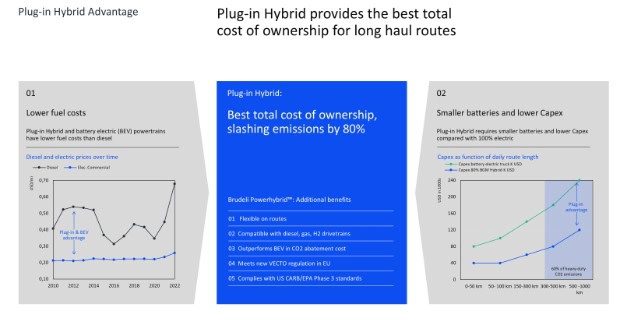Plug-In Hybrid – an Advantage?

Abstract:
In the quest for more sustainable and cost-effective heavy-duty transportation, plug-in hybrid trucks have emerged as a compelling solution – is it realy one? This article explores the advantages of plug-in hybrids, particularly in the context of long-haul routes. By comparing fuel costs, capital expenditures (Capex), and overall total cost of ownership (TCO) against fully electric and diesel-powered alternatives, we uncover why plug-in hybrids present a balanced approach to meeting environmental regulations and operational demands. The data underscores the potential of plug-in hybrids to reduce emissions significantly while offering financial benefits for fleet operators.
Introduction
As the transportation industry shifts towards greener technologies, heavy-duty trucks—an essential component of global logistics face increasing pressure to reduce their environmental impact. Traditional diesel trucks, while reliable, are being scrutinized for their high emissions and rising fuel costs. On the other end of the spectrum, fully electric vehicles (BEVs) offer zero tailpipe emissions but come with challenges related to range, battery size, and infrastructure.
Plug-in hybrid trucks, which combine an internal combustion engine with an electric powertrain, are emerging as a viable middle ground, especially for long-haul routes. This article examines the key advantages of plug-in hybrid heavy-duty trucks, focusing on their lower fuel costs, reduced capital expenditures, and the best total cost of ownership (TCO) compared to diesel and fully electric alternatives.
Lower Fuel Costs
One of the most compelling advantages of plug-in hybrid trucks is their ability to lower fuel costs. As shown in the accompanying graph, fuel prices for diesel have fluctuated significantly over the past decade, often peaking well above the cost of electricity for commercial use. This volatility in diesel prices creates a financial burden for fleet operators who rely solely on diesel-powered trucks.
In contrast, plug-in hybrid and BEV powertrains benefit from more stable and generally lower electricity prices. The graph illustrates that from 2010 to 2022, the cost per mile for electricity remained consistently lower than diesel, highlighting a key advantage of electrified powertrains. For plug-in hybrids, this translates into substantial fuel savings, especially when the trucks operate in electric mode during portions of their routes.
Moreover, plug-in hybrids offer the flexibility to switch between electric and diesel power depending on the route and operating conditions, allowing operators to optimize fuel use and reduce overall costs. This adaptability is particularly advantageous in scenarios where electricity is cheaper and more accessible, such as in urban areas with established charging infrastructure.
Smaller Batteries and Lower Capex
Another critical factor in favor of plug-in hybrids is the lower capital expenditure (Capex) required compared to fully electric trucks. Fully electric trucks demand large batteries to achieve the range needed for long-haul routes, significantly increasing their upfront cost. The graph comparing Capex as a function of daily route length reveals that the cost of battery electric trucks rises steeply as the route length increases, especially beyond 300 kilometers.
Plug-in hybrids, however, require smaller batteries since they can rely on their internal combustion engines for extended range, particularly on longer routes. The blue line representing plug-in hybrid Capex remains considerably lower across all route lengths, making them a more affordable option for long-haul trucking. This “plug-in advantage” becomes particularly evident for routes exceeding 500 kilometers, which account for a significant portion of heavy-duty CO2 emissions.
In essence, the combination of smaller batteries and the ability to use existing diesel infrastructure reduces the upfront investment needed for plug-in hybrid trucks. This makes them an attractive option for fleet operators who need to manage costs while transitioning to more sustainable technologies.
Best Total Cost of Ownership (TCO)
When evaluating the overall cost-effectiveness of heavy-duty trucks, the total cost of ownership (TCO) is a critical metric. TCO includes not only the purchase price but also fuel costs, maintenance, and compliance with emissions regulations over the vehicle’s lifespan.
Plug-in hybrids offer the best TCO for long-haul routes, primarily due to their lower fuel costs, reduced Capex, and compliance with stringent emissions standards. According to the data, plug-in hybrids can reduce emissions by up to 80% compared to conventional diesel trucks, a significant achievement that aligns with both EU VECTO regulations and US CARB/EPA Phase 3 standards.
The TCO benefits are further enhanced by the operational flexibility of plug-in hybrids. These vehicles can operate efficiently across diverse routes and conditions, using electric power where possible and switching to diesel for extended range. This flexibility not only reduces operational costs but also positions plug-in hybrids as a future-proof solution, capable of meeting evolving regulatory requirements without compromising performance or profitability.
Conclusion
Plug-in hybrid heavy-duty trucks represent a strategic balance between the need for sustainability and the practical realities of long-haul trucking. By offering lower fuel costs, reduced Capex, and the best TCO among available powertrain options, plug-in hybrids provide a compelling case for fleet operators looking to reduce emissions and operational costs simultaneously.
As the industry moves towards greater electrification, the role of plug-in hybrids is expected to grow, particularly in segments where full electrification is not yet feasible. With the ability to adapt to various route lengths and operating conditions, plug-in hybrids are poised to play a crucial role in the future of heavy-duty transportation.
References
- Brudeli Powerhybrid™. (2023). Analysis of the economic and environmental benefits of plug-in hybrid heavy-duty trucks. Picture provided by Brudeli Green Mobility AS.
- International Council on Clean Transportation (ICCT). (2023). “Heavy-Duty Vehicle Electrification: Challenges and Opportunities.” ICCT.
- Energy Information Administration (EIA). (2022). Historical data on diesel and electricity prices. EIA.


